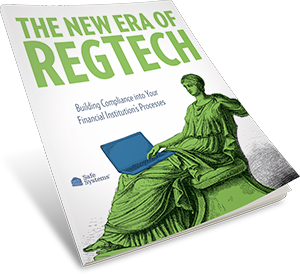How RegTech Solutions Have Changed the Financial Services Industry

Financial institutions today are tasked with finding new ways to manage risk and comply with changing regulations. This has led to the development of regulatory-focused technology or “RegTech,” a new product category that can be thought of as a subset of FinTech. RegTech solutions are specifically designed to address common regulatory challenges and help financial institutions effectively comply with these regulations in a more efficient, cost effective manner.
The Evolution of RegTech
Since its inception, RegTech has evolved and transformed rapidly. According to CB Insights, there are four key phases that showcase how RegTech solutions have changed over time:
- Manual — This initial stage of RegTech involved manually collecting and storing data. These basic reporting functions enabled compliance teams to manage and store data in programs like Microsoft Excel®. Many organizations have used these tools to streamline auditing, reporting, and reduce errors.
- Workflow Automation — As software matures to include workflows and automation around regulatory and compliance issues, the second phase of RegTech was formed. In the workflow automation phase, financial services organizations began using software for regulatory reporting, automating audit trails and compliance tasks. This level of automation reduces manual intervention and helps meet compliance and regulatory expectations.
- Continuous Monitoring — The continuous monitoring phase involves data analytics, process automation and back office integrations. With continuous monitoring, inconsistencies and compliance gaps are quickly noticed and fixed. This enables financial organizations to reduce risk and exposure to breaches, among other security threats.
- Predictive analytics — The future of RegTech is in new technologies, including advanced analytics, cognitive computing, the cloud, artificial intelligence and machine learning. Organizations are beginning to leverage artificial intelligence for risk identification, compliance intelligence, identity management and background screening. In addition, artificial intelligence and Big Data tools are being used to monitor pre-and post-trade compliance; deliver faster insights; increase efficiencies in compliance processes through automation, while reducing costs and offering foresight into emerging risk issues.
 RegTech has made a big impact on the industry, but this is just the beginning. These solutions are more important than ever as the number of regulatory changes rises along with an increased use of technology and focus on data and reporting. The fines imposed by regulators will continue to increase and the number of regulations will continue to grow. In fact, it is estimated that by 2020 there will be 300 million pages of regulations in existence, with fines for non-compliance likely to rise accordingly. With so much at stake, financial organizations must have a plan in place to implement RegTech solutions in their institutions.
RegTech has made a big impact on the industry, but this is just the beginning. These solutions are more important than ever as the number of regulatory changes rises along with an increased use of technology and focus on data and reporting. The fines imposed by regulators will continue to increase and the number of regulations will continue to grow. In fact, it is estimated that by 2020 there will be 300 million pages of regulations in existence, with fines for non-compliance likely to rise accordingly. With so much at stake, financial organizations must have a plan in place to implement RegTech solutions in their institutions.
For more information on RegTech, download our white paper, The New Era of RegTech: Building Compliance into Your Financial Institution’s Processes.
The New Era of RegTech
Building Compliance into Your Financial Institution’s Processes



